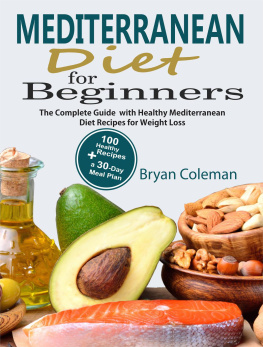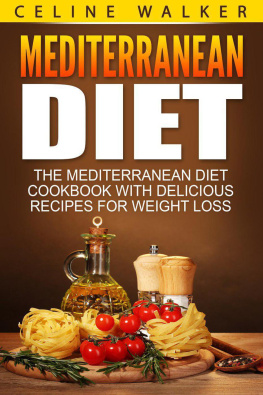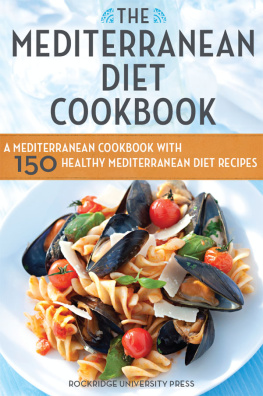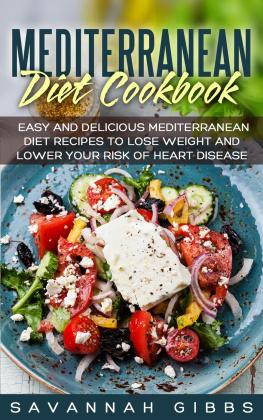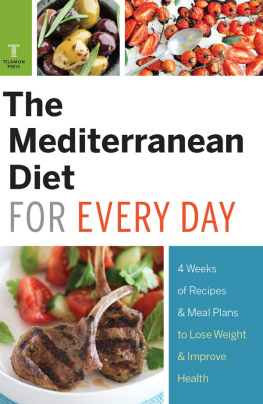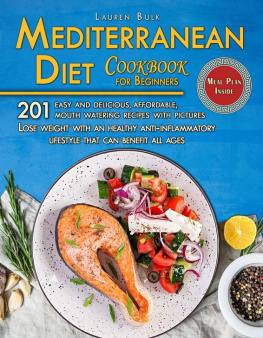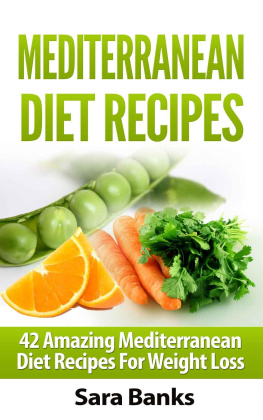MEDITERRANEAN DIET COOKBOOK
400+ Easy & Flavorful Recipes To Reset Your Metabolism And Lose Weight Fast For Lifelong Health

LIDIA SEASON
Copyright 2021 - All rights reserved.
The content contained within this book may not be reproduced, duplicated or transmitted without direct written permission from the author or the publisher.
Under no circumstances will any blame or legal responsibility be held against the publisher, or author, for any damages, reparation, or monetary loss due to the information contained within this book. Either directly or indirectly.
Legal Notice:
This book is copyright protected. This book is only for personal use. You cannot amend, distribute, sell, use, quote or paraphrase any part, or the content within this book, without the consent of the author or publisher.
Disclaimer Notice:
Please note the information contained within this document is for educational and entertainment purposes only. All effort has been executed to present accurate, up to date, and reliable, complete information. No warranties of any kind are declared or implied. Readers acknowledge that the author is not engaging in the rendering of legal, financial, medical or professional advice. The content within this book has been derived from various sources. Please consult a licensed professional before attempting any techniques outlined in this book.
By reading this document, the reader agrees that under no circumstances is the author responsible for any losses, direct or indirect, which are incurred as a result of the use of information contained within this document, including, but not limited to, errors, omissions, or inaccuracies.
Table Of Contents

Introduction
What is Mediterranean Diet?
T he Mediterranean diet, also known as the eating style of the ancient Greeks and Romans, is not a diet in the modern sense of how most people use that word. Rather, it is a term used to describe a lifestyle involving eating primarily plant foods in addition to healthy fats, with an emphasis on omega-3s and monounsaturated fats.
Additionally, this diet also includes small amounts of red meat instead of large amounts because people living near the Mediterranean Sea had easy access to rich and diverse food sources- far more than many other cultures at that time. The result is that they ate high-quality food with little need for additional supplements or vitamins. The key to this diet is that it promotes eating natural foods and is generally low in added oils, salt, sugar, and refined carbohydrates.
The Mediterranean diet also has a very low-calorie intake. Eating in this style helps promote a healthy weight because it naturally keeps you feeling full after eating only a small amount of food. This reduces cravings, simplifies meal planning, and keeps portions reasonable. Moreover, the high consumption of olive oil (found in every Mediterranean dish) has been shown to lower the risk of heart disease.
Origin of the Mediterranean Diet
Most people are surprised to learn that the term Mediterranean diet was first coined in 1956 by Ancel Keys as part of his study to find out why heart disease rates were less in southern Italy than they were in the United States.
The idea that a diet centered around fish, fruits, and vegetables can not only prevent heart disease but also be used as a treatment has been around for quite some time. Hippocrates (circa 460-370 BCE) is said to have prescribed an apple each day to patients for this purpose.
Physicians in ancient Greece would also prescribe portions of goat's cheese (called "rabits" at the time) and honey before sunrise as a treatment for heart problems. And Theophrastus (371-287 BCE) referred to the healthful benefits of olive oil in his writings.
What is interesting about this diet is that before European migration, no other culture maintained this same eating style. It was not until Christopher Columbus arrived in 1492 that Spanish and French merchants were introduced to the diet of southern Italy, which they named "Mediterrnea".
The term Mediterranean Diet was first introduced by Ancel Keys in a book called The Seven Countries Study published in 1970. The book detailed the results of his study, which established a link between increased consumption of olive oil and lower rates of heart disease. It is said that this study is the first time scientists documented that it was possible to lower risk factors for heart disease by making simple, healthy eating changes.
The Mediterranean diet emphasizes eating natural whole foods and cutting out added oils, salt, sugar, refined carbohydrates, and processed foods. This helps you feel fuller while reducing calories. Furthermore, this diet has also been shown to lower your risk of heart disease as well as lowering your cholesterol levels naturally without medication or surgery.
Why the Mediterranean Diet?
The Mediterranean diet is your best choice for a heart-healthy diet because:
It emphasizes eating only natural foods, which is under the Dietary Guidelines for Americans.
It provides plenty of omega-3s and low in oxidized fats, which lowers your risk of heart disease and reduces inflammation.
It contains relatively few calories, which helps you maintain a healthy weight because it keeps you feeling fuller longer.
It is an easy way to eat the foods you are supposed to eat daily, without the nagging thoughts of counting points or measuring portion sizes.
Benefits of the Mediterranean Diet
The benefits of the Mediterranean diet include the following :
It is as easy to follow as any other diet. This makes it extremely appealing for people who are looking to lose weight but don't want to spend all their time calculating points or calories.
It provides you with a satisfying yet healthy meal without adding extra calories from oils or grease.
It is rich in fiber, which helps keep your digestive system regular and lowers your risk of heart disease by lowering cholesterol levels naturally.
It encourages you to eat a variety of fruits and vegetables, with the added bonus that they are low in sugar and sodium .
It tastes good and is balanced, so you can eat it without the need for supplements.
It's an easy way to prevent and treat heart disease by focusing on what you should be eating instead of what you shouldn't.
It's part of a healthy lifestyle, meaning that it will be easier to maintain a healthy weight after you've reached your weight loss goal than if other diets are used.
What Foods to Eat
The foods in this diet are found at the heart of nearly all Mediterranean recipes. These include:
Fresh Fruits
Fish and seafood all types (including shrimp, salmon, tuna, shellfish, sardines) limited to 12 ounces per week.
Eggs 1 per day maximum; limit whole eggs. (Note: This is very low in cholesterol but high in saturated fat).
Olive oil 2 tablespoons per day. (Note: This is one of the healthiest oils available, but too much can be harmful).
Vegetables all types. (Note: This is a high fiber diet) .
Beans all types. (Note: You are allowed to eat many beans, but high-protein beans such as red kidney or pinto should be limited to 1 cup per week).
Nuts 2 ounces per day maximum; limit peanut butter and nuts. (Note: This is a source of omega -3s but can be very high in calories).
Whole grains 6 servings per day.


